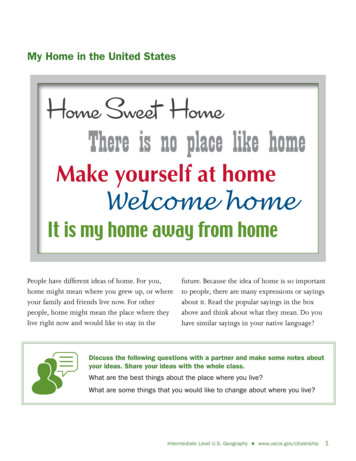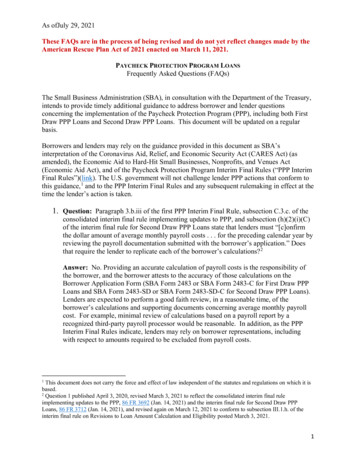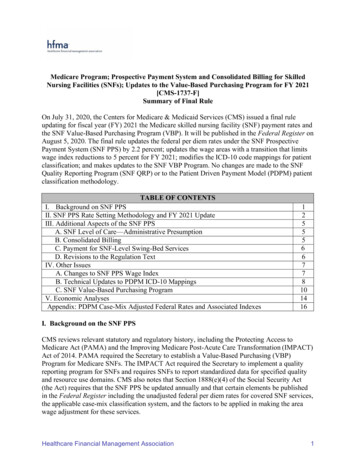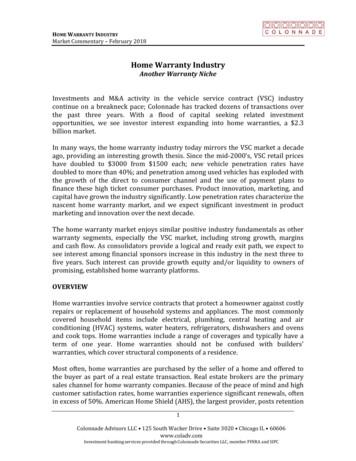
Transcription
Supporting a BetterTomorrow OnePerson at a TimeHome andCommunityBased ServicesFinal RuleRequirements
2Supporting a Better Tomorrow Purpose Rationale/Historyof CMS’s Final Rule FinalRule Requirements for Day andCommunity Living Implicationsfor IDD Services in Mississippi
3Supporting a Better Tomorrow Alphabet Soup DMH – Department of Mental HealthBIDD – Bureau of Intellectual andDevelopmental Disabilities ID/DD Waiver - (Intellectual Disabilities/Development Disabilities) IDDCSP – IDD Community SupportProgram
Supporting a Better Tomorrow Today4Alphabet Soup CMS – Medicaid’s federal governing authority Final Rule – CMS’s federal regulationsgoverning the settings where ID/DD Waiverand IDD CSP services can be provided PSS – Plan of Services and Supports SC – Support Coordinator for ID/DD Waiver TCM – Targeted Case Manager for IDD CSP HCB – Home and community based LOC – Level of Care ICF/IID – Intermediate Care Facility forIndividuals with Intellectual Disabilities(Centers for Medicare and Medicaid Services)
Supporting a Better Tomorrow Today5Overview of Home andCommunity Based Services
6Supporting a Better Tomorrow What are Home and CommunityBased Services? Non-traditionalMedicaid servicesprovided at home and in the communityas an alternative to institutional services “Waiver” HCBSMedicaid State Plan HCBS
7Supporting a Better Tomorrow What are Home and CommunityBased Services? “Waivers” began in 1982Response to parents/advocates claim thatservices at home/in community are lessexpensive than institutional servicesAllows states to “waive” certain CMSregulations Statewideness Comparability(allows waiting lists) Certain income requirements
8Supporting a Better Tomorrow What are Home and CommunityBased Services? HCB Medicaid State Plan Services NOT a waiverSections 1915(i), (j) & (k) of the Social SecurityActIncluded in Deficit Reduction Act of 2005/ACAof 2010Final Regulations issued in 3/17/14 for all HCBSAllows states to cover services previously onlyavailable through “waivers” via the regularMedicaid State PlanMay define the groups coveredCannot limit the number of participants
Supporting a Better Tomorrow Today9Mississippi’s Waivers1.Elderly and Disabled Waivera.b.c.d.2.Ages 21 and olderNursing Home level of careArea Agencies on AgingMedicaid eligible (adjusted income)Independent Living waivera.b.c.d.e.Ages 16 and olderHave a severe neurological or orthopedicimpairmentNursing Home level of careMS Department of Rehabilitation ServicesMedicaid eligible (adjusted income)
Supporting a Better Tomorrow Today10Mississippi’s Waivers3.Traumatic Brain Injury/Spinal Cord InjuryWaivera.b.c.d.e.4.No age restrictionsDiagnosis of traumatic brain or spinal cordinjury and medically stable.Nursing Home level of careMS Department of Rehabilitation ServicesMedicaid eligible (adjusted income)Assisted Living Waivera.b.c.d.Ages 21and olderNursing Home level of careDivision of MedicaidMedicaid eligible (adjusted income)
Supporting a Better Tomorrow Today11Mississippi’s Waivers5.Intellectual Disabilities/DevelopmentalDisabilities (ID/DD) Waivera.b.c.d.e.f.No age restrictionsICF/IID Level of CareIntellectual/developmental disabilityDepartment of Mental HealthMedicaid eligible (adjusted income)Comprehensive services
12Supporting a Better Tomorrow Mississippi’s HCB Medicaid StatePlan Service Intellectual/DevelopmentalDisabilitiesCommunity Support Program(IDD CSP/1915(i)) Eligibility 18years or older and completed servicesthrough educational system Must have an intellectual and/ordevelopmental disability Must meet the requirements for a Certificateof Developmental Disability Must demonstrate the need for habilitation
13Supporting a Better Tomorrow Mississippi’s HCB Medicaid StatePlan Services Eligibility (cont’d)Must demonstrate need for support in 2 ofthe 5 following areas on a continuing orintermittent basis Employment SocialSupport System Instrumental Activities of Daily Living Social Behavior Financial Assistance
14Supporting a Better Tomorrow How to apply for ID/DD Waiverand IDD CSP ServicesContact the DMH Regional Program in yourarea to access their Diagnostic ServicesDepartmentDMH IDD Regional ProgramsHudspeth Regional CenterWhitfieldSouth MS Regional CenterLong BeachBoswell Regional CenterMageeNorth MS Regional CenterOxfordEllisville State SchoolEllisville
15Supporting a Better Tomorrow ID/DD Waiver ServicesIDD CSP ServicesBehavior SupportTherapiesSupervised LivingDay Services – AdultHost HomesCommunity RespiteIn-Home RespiteSupported LivingCrisis SupportShared SupportedLivingIn-Home NursingRespiteSupportedEmploymentTransition AssistanceCrisis InterventionSupportCoordinationHome andCommunity SupportsPrevocationalServicesSpecialized MedicalSuppliesJob Discovery
16Supporting a Better Tomorrow IDD CSP ServicesIDD CSP ServicesDay HabilitationPrevocational ServicesSupported Employment Targeted Case ManagementMust be used by all IDD CSP participants
17Supporting a Better Tomorrow Conflict Free Case Management Support Coordination (SC) – ID/DD WaiverTargeted Case Management (TCM) – IDDCSPProvided through the IDD RegionalProgramsID/DD Waiver services provided by the DMHIDD Regional Programs are beingtransitioned to private providers
18Supporting a Better Tomorrow Rationale & Overview ofCMS’s Final Rule
19Supporting a Better Tomorrow CMS Final Rule Rationale History of the HCB Settings Final RuleResult of multiple rulemaking efforts over the last5 years and consideration by CMS of input fromthousands of stakeholdersThe intent of the rule is to: Enhancethe quality of HCB services Provide additional protections to HCBS programparticipants Ensure that people receiving services through HCBprograms have full access to the benefits ofcommunity living Ensure people have the opportunity to receivethese services in a manner that protects individualchoice and promotes community integration
20Supporting a Better Tomorrow CMS Final Rule Overview Establishes requirements for Person CenteredPlanning Establishes requirements for the following settings:1.Supervised Living (ID/DD Waiver)2.Shared Supported Living (ID/DD Waiver)3.Day Services – Adult (ID/DD Waiver)4.Day Habilitation (IDD CSP)5.Prevocational Services(ID/DD Waiver and IDD CSP)
21Supporting a Better Tomorrow Goal of Final Rule To“ensure people receiving servicesthrough HCB programs have full access tothe benefits of community living” To“further expand the opportunities formeaningful community integration ” Toensure people have CHOICES about allaspect of their lives
22Supporting a Better Tomorrow Let’s Change How We ThinkMichael Smull video“Person Centered Thinking”Click Here for Videohttps://www.youtube.com/watch?v 2rmLtU6FYBE
23Supporting a Better Tomorrow People have Rights to Choose Who supports themWhere they liveWho they live withHow they spend their timeHow they spend their resources
24Supporting a Better Tomorrow About the overview of HCBServices and Rationalefor the Final Rule
25Supporting a Better Tomorrow Requirements for All Settings
26Supporting a Better Tomorrow Timelines Regulationsbecame effective 3/17/14 Stateshave 8 years to come into fullcompliance with requirements (3/17/22) Evaluation of rules and regulationsSite assessmentsParticipant interviews
27Supporting a Better Tomorrow Settings that are NOTHome & Community Based NursingHomes Hospitals Institutions for Mental Disease Intermediate Care Facilities for Individualswith Intellectual Disabilities (ICF/IID)
28Supporting a Better Tomorrow Settings that are Presumed NOTto be Home & Community Based Settings that are publicly or privatelyowned providing inpatient treatmentSettings that are on the grounds of oradjacent to a public institutionSettings with the effect of isolatingpeople from the broadercommunity
29Supporting a Better Tomorrow Characteristics of Home andCommunity Based Settings ALL HCB settings characteristics are met for EVERYpersonServices: Allowpeople the freedom and support to controltheir own schedules and activities Are integrated in and support access to thegreater communityAllow opportunities for engaging in communitylife
30Supporting a Better Tomorrow Characteristics of Home andCommunity Based Settings Mustallow for control of personalresources The setting is selected by the person fromamong setting options, including nondisability specific settings Must provide opportunities to seekemployment and work in competitive,integrated settings
31Supporting a Better Tomorrow Characteristics of Home andCommunity Based Settings Mustensure the person receives servicesin the community to the same degree ofaccess as someone not receiving services Mustensure the person’s rights of privacy,dignity, respect, and freedom fromcoercion and restraint
32Supporting a Better Tomorrow Characteristics of Home andCommunity Based Settings Must optimize individual initiative, autonomyand independence in making life choices Must facilitate individual choice regardingservices and supports and who provides them Focus on more integrated models Activities must be person-centered based onindividual outcomes identified in the PSS
33Supporting a Better Tomorrow Requirements Specific toSupervised and Shared SupportedLiving
34Supporting a Better Tomorrow Requirements for All ResidentialSettings Peoplemust be given an option of a nondisability specific setting and of a privateunit (if they have the resources) Peoplehave the freedom to furnish anddecorate their sleeping or living unitswithin the lease or other agreement Peoplemust be given a key to the unit,with only appropriate staff having keys todoors
35Supporting a Better Tomorrow Requirements for ResidentialSettings Peoplesharing units have a choice ofroommate in that setting Peoplemust have access to food atall times Peoplechoose when, where and withwhom they eat
36Supporting a Better Tomorrow Requirements for ResidentialSettings Peoplecannot be made to attend aday program if they desire to stayhome, are sick, or have appointmentsduring the day Peoplechoose Thecan have visitors when theysetting is physically accessible(ADA compliant)
37Supporting a Better Tomorrow Requirements for ResidentialSettings CMSdoes not set a limit on the number ofpeople living in each setting, but Statescan set their own restrictions Mississippi– newly certified sites – no morethan 4 people Existinglarger sites will be examined todetermine compliance with requirementsof Final Rule
38Supporting a Better Tomorrow Requirements forProvider/Owned ControlledResidential Settings Inaddition to the qualities listed above,the following additional conditions mustbe met: The unit or dwelling is a specific physicalplace that can be owned, rented oroccupied under a legally enforceableagreement by the person receiving services
39Supporting a Better Tomorrow Requirements forProvider/Owned ControlledResidential Settings Theperson has, at a minimum, the sameresponsibilities and protections fromevictions that tenants have under thelandlord/tenant laws of the State, county,city or other designated entity
40Supporting a Better Tomorrow Requirements forProvider/Owned ControlledResidential Settings Forsettings in which landlord/tenant lawsdo not apply: The State must ensure that a lease,residency agreement, or other form ofwritten agreement, will be in place for eachperson receiving services (Rule 30.1.E)The agency must provide protections thataddress eviction processes and appeals(discharge procedures)comparable tothose provided under the landlord/tenantlaws of the State
41Supporting a Better Tomorrow Requirements for Day ServicesAdult, Prevocational and DayHabilitation Services
42Supporting a Better Tomorrow Requirements for Day Settings Peoplemust be given choices aboutactivities and participation in them Foodchoices are available Facility-basedday settings must be closelyexamined and may be presumedinstitutional
43Supporting a Better Tomorrow Requirements for Day Settings Peoplemust be given an option of a nondisability-specific setting (employment inthe community) Statescan require all day services becommunity-based (no physical location)
44Supporting a Better Tomorrow Requirements for Day Settings Reverse integration alone is not a sufficientway to comply with settings requirements ofthe Final rule Some day settings will need to be closelyexamined as potentially isolating including: Sheltered workshops/PrevocationalFacility based Day Habilitation and/or DayServices-AdultFocus on community employment
45Supporting a Better Tomorrow About the settings requirements
46Supporting a Better Tomorrow Person CenteredPlanning Requirementsand Processes
47Supporting a Better Tomorrow How is Person-Centered PlanningChanging?
48Supporting a Better Tomorrow Don’t Dis My AbilitySay It To My Face VideoClick Here for Videohttps://www.youtube.com/watch?v mdOWCQEyUJs
49Supporting a Better Tomorrow Wolf Wolfensberger Theory ofSocial Role ValorizationIf people with disabilities can gainvalued social roles within ourcommunities, the chances of livinga good life go way up.
50Supporting a Better Tomorrow What does Society Value? Relationships Wealth Healthand Beauty Youth and Newness Independence Productivity Pleasurable Life
51Supporting a Better Tomorrow Hurtful Consequences ofFeeling Devalued Rejection LowSelf-Esteem Hopelessness Loneliness Distrust Withdrawn Anger
52Supporting a Better Tomorrow Supporting People to GainValued Social Roles in: Relationships Employment Hobbies Religion Civicactivities
53Supporting a Better Tomorrow Person-Centered PlanRequirements Plan of Services and Supports (PSS)Must be conducted at least annually withthe person’s TEAM (family, providers, friends,others the focus person wants at themeeting) At a minimum:Person and legal guardian (if applicable)Provider(s)
54Supporting a Better Tomorrow Person-Centered PlanRequirements Heightenedrole for SupportCoordinator/Targeted Case Manager inmonitoring PSS implementation Offersinformed choices to the personregarding the services and supports theyreceive and their providers Includesa method for the person torequest updates to the PSS at any time
55Supporting a Better Tomorrow Person-Centered PlanRequirements ThePSS must reflect: Servicesand supports important TO andFOR the person Theperson’s strengths and preferences
56Supporting a Better Tomorrow Person-Centered PlanRequirements The PSS must reflect:Alternative HCB settings that wereconsidered by/offered to the person(everyone ages 18 ) The setting in which the person resides ischosen by the person (everyone ages 18 ) Clinical and support needs as identifiedthrough an assessment of functional need(ICAP and Risk Assessment)
57Supporting a Better Tomorrow Person-Centered PlanRequirements ThePSS must document: Risk factors and the measures in place tominimize them (Risk Assessment Tool) Individualized back up plans and strategieswhen needed
58Supporting a Better Tomorrow Person-Centered PlanRequirements ThePSS must be understandable to theperson receiving services and supportsand individuals important in supportinghim or her Plain language and a manner accessible topeople with disabilities and those who havelimited English proficiency
59Supporting a Better Tomorrow Person-Centered PlanRequirements Mustidentify the individual and/or entityresponsible for monitoring the plan(Support Coordinator/Targeted Case Manager) Mustbe finalized and agreed to Informed consent of theperson/guardian in writing Signed by all individuals and providersresponsible for implementation
60Supporting a Better Tomorrow Person-Centered PlanRequirements Mustbe sent in writing to the person andothers involved in the plan Mustdocument any modifications to aperson’s HCB setting are supported by aspecific assessed need and justified in thePSS
61Supporting a Better Tomorrow Requirements for Modificationsto any Requirements of the FinalRule Thefollowing must be documented if aperson’s HCB setting is modified: A specific and individualized assessed need The positive interventions and supports used prior toany modifications to the PSS Less intrusive methods of meeting the need thatwere tried but did not work A clear description of the condition that is directlyproportionate to the specific assessed need
62Supporting a Better Tomorrow Documentation Requirements forModifications The following must be documented if aperson’s HCB setting is modified: Regular collection and review of data to measurethe ongoing effectiveness of the intervention Established time limits for periodic reviews todetermine if the modification is still necessary orcan be terminated An assurance that interventions and supports willcause no harm to the person Informed consent of the person in writing
63Supporting a Better Tomorrow About Person Centered Planning
64Supporting a Better Tomorrow Implementation of theFinal Rule
Supporting a Better Tomorrow Today65Statewide Transition Plan (STP) Thevehicle through which statesdetermine their compliance with therequirements for the home andcommunity-based settings Final Rule anddescribe to CMS how they will complywith the new requirements Mustinclude the state’s assessment of theextent to which its regulations, standards,policies, licensing requirements, and otherprovider requirements ensure settings willcomply with the requirements of the FinalRule
Supporting a Better Tomorrow Today66Statewide Transition Plan (STP) Mustdescribe actions the state proposesto assure full and on-going compliancewith the HCBS settings requirements, withspecific timeframes for identified actionsand deliverables Mustprovide opportunity for public input
Supporting a Better Tomorrow Today67Statewide Transition Plan Mississippi’s “Initial” STP was5/25/17 (started work in 2015) approvedThe state completed its systemicassessment and included the outcomes inthe STP Thestate clearly outlined remediationstrategies to rectify issues that thesystemic assessment uncovered and isactively working on those remediationstrategies Changesto DMH Operational Standards,Medicaid Administrative Code, ID/DDWaiver renewal, and IDD CSP Renewal
Supporting a Better Tomorrow Today68Statewide Transition Plan What Provider self assessments were sent out in2015 has been done to date?Yielded very little meaningful dataNew providers were not surveyedSystemic assessment of regulations, etc.DMH Site Visits for physical locationassessmentDevelopment of Survey Tool (based onCMS Exploratory Questions) to gatherinformation from people receiving servicesand staff Resultsto determine compliance must focuson experiences of the person
Supporting a Better Tomorrow Today69Examples of ExploratoryQuestions for ParticipantsAre you allowed to do activities with the people of your choice?Are you required to stay in one room/space? For example, canyou go outside for a break when you choose? Or change toanother activity?Tell me about the things you do in the community. Where doyou go? What do you do? Do staff ask you where you would liketo go?Do you have access to your money when you need it or want tobuy something?
Supporting a Better Tomorrow Today70Examples of ExploratoryQuestions for StaffDo people decide where they go and what they want to doeach day? Can someone choose to go with their friends or doesstaff keep group/housemates together?Do people decide what they eat, when they eat, where they eat,and with whom they eat?Do people have access to their money when they want it andcan they spend it on what they want?Can people choose how to cut and fix their hair? Do theydecide when to get their hair cut/fixed?Does you call people things like “honey” or “baby” or do youuse the person’s preferred name?
Supporting a Better Tomorrow Today71Examples of Observation SurveyAre people actively engaged in an activity or sitting idle?Describe.Are staff actively engaged with the people? Describe. Ifstaff is not actively engaged, what are they doing?Does staff speak appropriately to people, for example,baby talk or stern tone? Describe/give example.Do people move about freely? Or are they kept with agroup? Are there gates, locked doors, or other barriers toprevent people from entering or exiting certain areas of thesetting?
Supporting a Better Tomorrow Today72Statewide Transition Plan Whatis left to be doneaccording to CMS? Completecomprehensive site-specificassessments of ALL home andcommunity-based settings Independent contractor Draft remediation strategies and acorresponding timeline that will resolveissues that the site-specific settingsassessment process and subsequentvalidation strategies identified Independent contractor and State Remediation can be staggered
Supporting a Better Tomorrow Today73Statewide Transition Plan Whatis left to be done accordingto CMS? Outlinea detailed plan foridentifying settings that arepresumed to have institutionalcharacteristics, including qualitiesthat isolate HCBS beneficiaries, aswell as the proposed process forevaluating these settings andpreparing for submission to CMS forreview under Heightened Scrutiny DMH reviewed physical settings lastcalendar year
Supporting a Better Tomorrow Today74Statewide Transition Plan Whatis left to be done accordingto CMS? Developa process for communicatingwith people receiving services insettings that the state has determinedcannot or will not come intocompliance with the home andcommunity-based settings criteria Establishongoing monitoring andquality assurance processes that willensure all settings providing HCBScontinue to remain fully compliant withthe rule in the future DMH Certification Team
Supporting a Better Tomorrow Today75Statewide Transition Plan Service sites must be assigned to 1 of the following4 categories:1.Fully align with the Federal requirements2.Do not comply with the Federal requirements, but canwith modifications3.Cannot meet the Federal requirements and will nolonger be allowed to claim reimbursement fromMedicaid for waiver/1915i services and/or mustrelocate people receiving services4.Are presumptively non-home and communitybased but for which the state will providejustification/evidence to show that those settingsdo not have the characteristics of an institutionand do have the qualities of home andcommunity-based settings (to be evaluated byCMS through the heightened scrutiny process)
76Supporting a Better Tomorrow Meaningful OpportunitiesSupports
Supporting a Better Tomorrow Today77Rationale for MeaningfulOpportunities Supports Servicedeveloped in response to need toreduce reliance on PrevocationalServices provided in sheltered worksettings CMS states:“ services that teach job task specificskills for the primary purpose of completingthose tasks for a specific facility-based joband are not delivered in an integrated worksetting” are not covered Waiverservices Prevocational Services must be timelimited.”(CMS Informational Bulletin 9/16/2011)
Supporting a Better Tomorrow Today78Rationale for MeaningfulOpportunities Supports Mississippi is not the only state with overreliance on sheltered –vs – integrated work Some states are strugglingSome states have closed workshopsSome states are in process of closing workshopsPrevocational Services in sheltered workshopsisolate people from community, according toCMSFinal Rule examines access to the communityunder a very bright lightFinal Rule emphasizes the importance of work
Supporting a Better Tomorrow Today79Meaningful OpportunitiesSupports Development Responseto a need to break down “silos” ofservices and meet individual desires for lifegoals and outcomes Developed by an Employment WorkgroupEmployment Workgroup MembersCMHCsPrivate ProvidersBIDD StaffMedicaidAdvocatesDMH Regional Program Staff Combedthrough other states and theirdefinitions and activities Tried to take the best of all of them
Supporting a Better Tomorrow Today80Meaningful OpportunitiesSupports Combinesbest parts of Day Services –Adult/Day Habilitation/PrevocationalServices Meetsthe requirements of the Final Rule
Supporting a Better Tomorrow Today81Meaningful OpportunitiesSupports Meaningful Opportunities Supports must bedesigned to enable a person to enrich his or herlife and enjoy a full range of meaningful activitiesincluding: Opportunities to seek employment and work incompetitive integrated settings. Activities caninclude:Career exploration, including assessment of intereststhrough volunteer experiences Job tours Job shadowing Situational assessments Internships Access to WIN Job Centers or other job findingresources, etc.
Supporting a Better Tomorrow Today82Meaningful OpportunitiesSupports Referral to the Mississippi Department ofRehabilitation Services for any person interested inactively seeking competitive integratedemployment so that information gathered can beused to expedite eligibilityFull participation in community life to the samedegree of access as people not receiving ID/DDWaiver servicesControl of personal resources (e.g., the providercannot limit the use of someone’s personalresources as a means of coercion or punishment). Providers cannot restrict access to personalresources in any wayProviders must offer informed choice of theconsequences/risks of unrestricted access topersonal resources.
Supporting a Better Tomorrow Today83Meaningful OpportunitiesSupports Optimize, not regiment, a person's initiative,autonomy, and independence in making lifechoices related to: Developing, enhancing, and maintaining abilities inpersonal, social, and community activitiesIndependent living skillsPursuit of personal interests and hobbiesThe services are intended for people who: Are on a pathway to employmentAre employed part-time and would like go to aplace that offers both structured & unstructuredactivities, choices, and community participationwhen not workingHave declined employment opportunitiesAre of retirement age
Supporting a Better Tomorrow Today84Meaningful OpportunitiesSupports People receiving Meaningful OpportunitiesSupports may also receive SupportedEmployment or Job Discovery services as long asMeaningful Opportunities Supports services do notduplicate activities being provided by otherservices.The provider is required to allow at least one staffperson, invited by the person, who works withhim/her on a daily basis and who knows him/herbest, to attend the person’s PSS meeting Supervisory staff who do not have at least dailycontact with a person do not meet the staffattendance requirement, but may attend if invitedby the person in order to assist in writing the ActivitySupport Plan at a later time
Supporting a Better Tomorrow Today85Meaningful OpportunitiesSupports People are to be afforded respectful treatmentby staff. Providers must also ensure that peopleare free from coercion and restraintPeople must have access to food at any time,unless the person’s diet is prescribed by an M.D.,Nurse Practitioner or Licensed Dietician/Nutritionist. If a diet is prescribed, it must bedocumented in the PSS and Activity Support Planand be attached to both. The program mustassist the person in adhering to the prescribeddiet.The provider is not responsible for snacks andmeals unless a person did not bring his/hers. Inthat case the provider must provide a nutritiousmeal and snacks for the day for that person.
Supporting a Better Tomorrow Today86Meaningful OpportunitiesSupports Theprovider must provide opportunities forpeople to learn cooking skills, even if notproviding meals for everyone in the program Peoplemust have choices about the foodthey eat, if provided by the program Peoplemust have choices of when and withwhom they eat. These choices cannot beregimented
Supporting a Better Tomorrow Today87Meaningful OpportunitiesSupports Alsoinclude usual requirements regardinghealth and safety (square footage, etc.) Levelof staffing determined by ICAP ReimbursementAdultrate equal to Day Services –
Supporting a Better Tomorrow Today88Do We Comply withHCBS Final Rule? Dopeople choose who supportsthem? Do they choose where they live? Do they choose with whom theylive? Do they choose how they spendtheir time? Do they choose how they spendtheir resources?
Supporting a Better Tomorrow Today89How Do We Change? Move from superficial compliance toreal change Changeour mindset Support people in having choices andattaining what they value most Support them in engaging in theircommunity
90Supporting a Better Tomorrow
91Supporting a Better Tomorrow Contact InformationMississippi Department ofMental Healthdmh.ms.govBureau of Intellectual andDevelopmental Disabilities601-359-6243Ashley Lacoste, DirectorDivision of HCBSashley.lacoste@dmh.ms.gov601-359-6240Betty Pinion, DirectorIDD Community Support Programbetty.pinion@dmh.ms.gov(601)359-5797
Mississippi’s Waivers 3. Traumatic Brain Injury/Spinal Cord Injury Waiver a. No age restrictions b. Diagnosis of traumatic brain or spinal cord injury and medically stable. c. Nursing Home level of care d. MS Department of Rehabilitation Services e. Medicaid eligible (adjusted income) 4. Assisted









